This isn’t a comprehensive ABCs of parenting article and no
way on earth am I going to make it sound like one. Or is it?
Some words are missing from this list, it was such a hard
time letting go of such important words I feel do describe parenting and
caregiving aptly. But there can only be one A for Apple and a for akara, right?
These words not only describe what parenting is all about to
many parents (and caregivers), it also describes how it feels like on some
days!
So here goes the inclusive and non-comprehensive ABCs of
parenting:
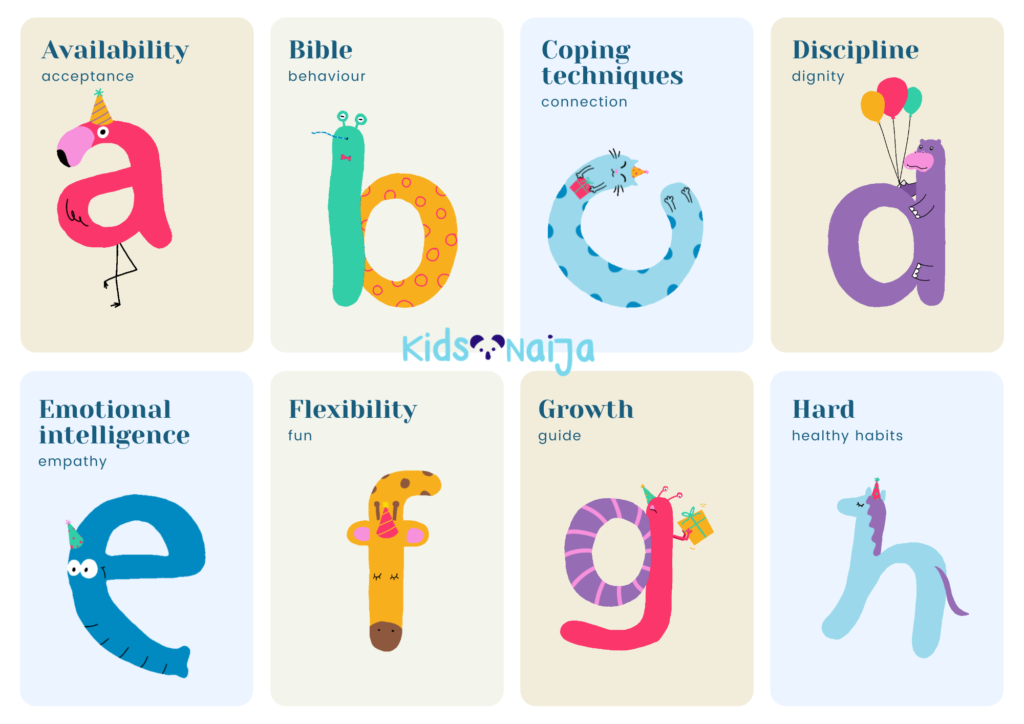
A for Availability and a for acceptance
Make yourself available. Kids just don’t want a parent who provides them with things they want; they want someone available as well, especially emotionally.
Hence, no matter how busy you are trying to provide for them, remember that shelter, food, and clothing are almost just as important as time to them.
How does acceptance come in? Accept that parenting or being the primary caregiver of a child changes you and your life. Life after parenting is never the same as life before it. Accept that there’ll be hard days and there’ll be soft days.
B for Biblical and b for behaviour
Hehehe, keep calm! For many, parenting without the Bible isn’t possible.
Behaviour is communication. There’s simply not a better way to define behaviour and that’s why you should keep your eyes out for the hidden communication behind every behaviour.
When a child has a tantrum, what are they trying to say?
C for Calming/coping techniques and c for connection
Life is full of ups and downs, and you can’t always clear out every struggle for your child. Eventually, they’ll have to learn how to walk through the difficult times on their own – they’re going to need good coping techniques when the time comes.
Connect with your child emotionally. Go back to when you were still a child, what form of connection did you crave the most from your family?
Now you know what to do better!
D for Discipline and d for dignity
Hold on!
Is there ever a talk about parenting that doesn’t include discipline – one of the hallmarks of parenting? Teach and correct little ones but with love and gentleness. Discipline shouldn’t push your child away from you – rather, it should be a bridge that builds, not destroys.
One sentence: Treat children with dignity (self-respect).
E for EQ and e for empathy
Parenting without emotional intelligence (EQ) is parenting gone wrong. Emotionally intelligent kids are better able to identify and regulate their feelings.
They are also able to develop healthier social relationships (with others) and make better decisions.
Empathy is closely linked to EQ. For many, it’s the 5th component of EQ. It’s that word that’s more practical than theory and helps strengthen the emotional bond between you and your little ones.
F for Flexibility and f for fun
Parenting is a flexible lifestyle. Allow room for exceptions and bend the rules once a while. Not saying you should do this for all rules but surely, some of those rules are dynamic enough to allow for change. All rules shouldn’t be static and fixed.
Make it fun. You and the family should create something fun that everyone gets to enjoy. It could be game night, family dinner night, a vacation, cooking or whatsoever it is that tingles your family’s fancy.
G for Growth and g for guide
When there’s growth, acknowledge it no matter how “insignificant” it might look to you. Create room for your kids to grow, don’t be a lawnmower parent.
If you equip kids with the right tools to headbutt difficult times, they’ll grow and won’t need you to mow the lawn.
Guide, don’t push. Parenting isn’t an opportunity for you to recreate yourself in your child. It’s your opportunity to help guide your child into discovering who they’re truly meant to be and achieve their potentials.
H for Hard and h for healthy habits
One truth that both parents and non-parents agree on is that parenting is truly hard. It’s a lot to take in and accepting that it’s hard is a fine way to get onboard this train. Have a tribe and know when to take a step back and breathe.
Healthy habits should include habits that cut across your mental and emotional health as well. Eat fruits and veggies. Take a walk. Breathe. Hug your kids. Get enough physical activity.
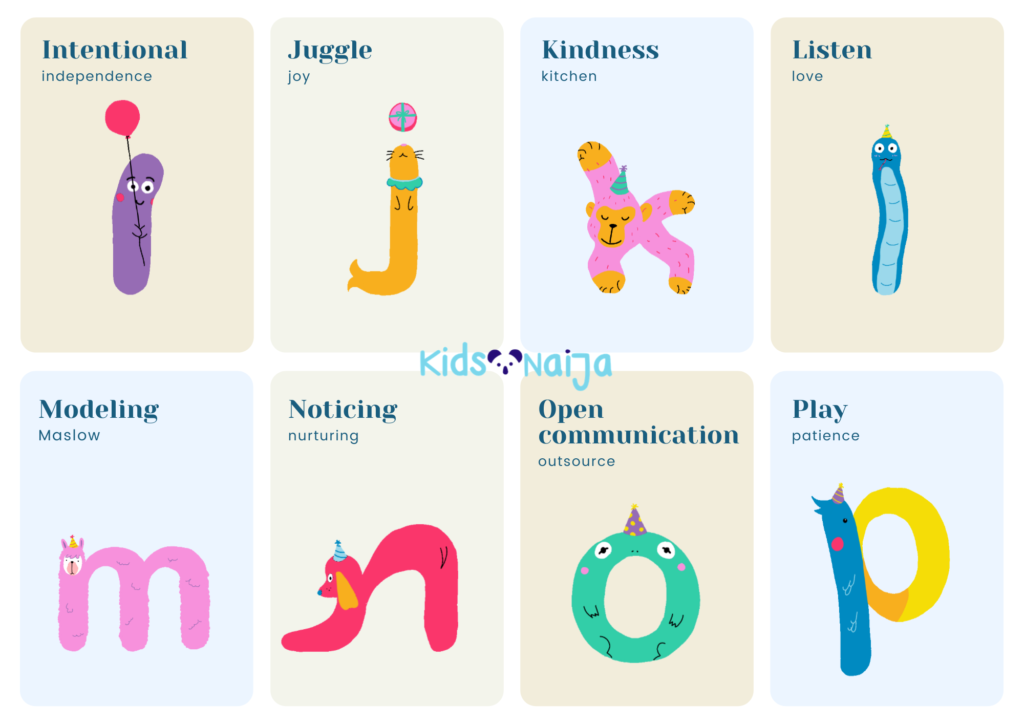
I for Intentional and i for independence
Parenting should be intentional. This doesn’t mean you have to read tons of parenting books but the point is to be intentional about how you raise your kids and the values you teach them.
Independence? Give it. Your home isn’t a prison neither are your children prisoners. Let them go out, stop trying to keep them home, and sometimes, allow them to rebel..
J for Juggle and j for joy
Can you have it all as a parent?
With children running around, you need to find the balance and rhythm of your parenting lifestyle. Don’t try to multitask, new research shows that multitasking is an ineffective skill to learn so skip it and find a balance instead. PS: on some days, there’ll be no balance and that’s okay.
Parenting is joyful. Every parent has the moments that bring joy for them. It may not be when you carry your child in your arms for the first time but these moments will come, and you’ll know when they do.
K for Kindness and k for kitchen
Be kind and teach/model kindness in your home. Don’t get carried away with the mantra that the world isn’t kind; hence kindness will make your kids weak. It won’t.
Cooking is a good way to bond but it doesn’t have to be yours. However, if possible, cooking once in a blue moon with your family is an activity that’s worth giving a try. Of course, make healthy meals.
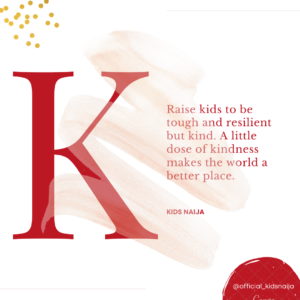
L for Listen and l for love
Don’t get carried away with the idea of being heard that you forget about listening or hearing the other person which in this case is your child. Listen when they talk and if they aren’t talking, remember that B is for behaviour.
Do parents really have a favourite child? I’m convinced that my parents did. Whether you do or not, don’t make it obvious or exhibit traits of favouritism
Make it fun. You and the family should create something fun that everyone gets to enjoy. It could be game night, family dinner night, a vacation, cooking or whatsoever it is that tingles your family’s fancy.
M for Modelling and m for Maslow
You already know that children generally copy and mimic their parents. They’re always on the lookout for things to imitate and these include oral hygiene, screen time, and even food/beverage choices. Use their innate mimicking ability as an opportunity for them to model healthy habits and good values from you.
Maslow is a scientist who organized human needs in a hierarchical order. These needs range from basic needs like food to psychological needs to self-fulfillment needs.
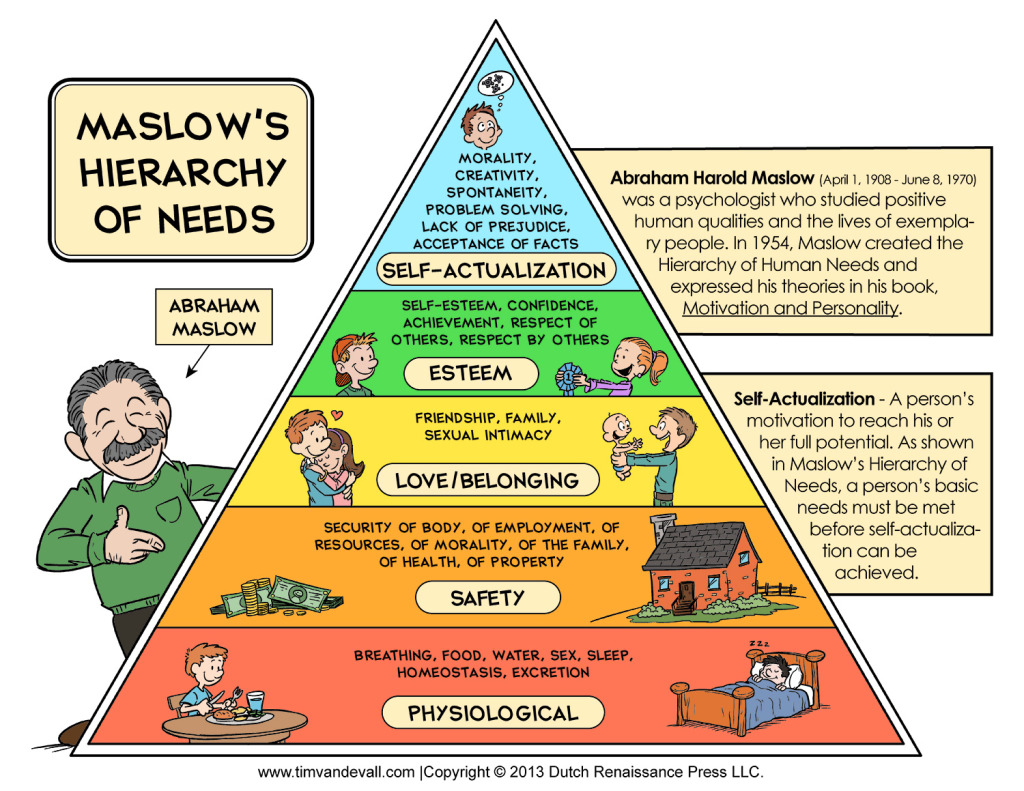
N for Noticing and n for nurturing
Notice your child’s efforts. You likely won’t be able to notice everything, but when you do notice something, acknowledge it. Let them know that you see and appreciate their efforts. Also, don’t assume that they aren’t making any effort when you can’t see any noticeable change. Sometimes, change is subtle.
Nurturing: Help your kids develop or grow, raise them with practical life skills, and nourish their body, mind, and soul.
O for Open communication and o for outsource
A parent-child communication is said to be open when both parties can express their ideas, thoughts, and feelings during a conversation.
When communicating with your little ones and teens, leave the conversation open. Ask open-ended questions “what do you think about the colour red?” instead of “do you like red?”
Don’t forget to pair this up with L for listening.
Outsource when you can! Being a good parent doesn’t mean doing everything single thing all on your own every darn time. Call that babysitter. Order dinner. Hire someone to do the cleaning. Get someone to do the laundry or grocery. Don’t try to do everything by yourself every time – say no to parental burnout.
P for Play and p for patience
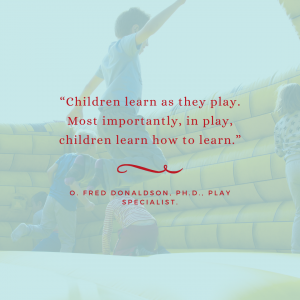
Let the kids play. My father wasn’t always so keen on letting us play while we were young; he felt there were better things to do such as books. He’d rather let us watch TV than play outdoors. Oddly enough, one day, I caught myself doing almost the same thing and since then, I’ve been more intentional about letting children play. Playing is how they learn and interact with their environment. Don’t take it away from them.
Be patient with kids. I understand that sometimes (or most times) it looks like they’re trying to get on your nerves intentionally or trying to drive you nuts. During those times, be patient, take a break and just breathe.
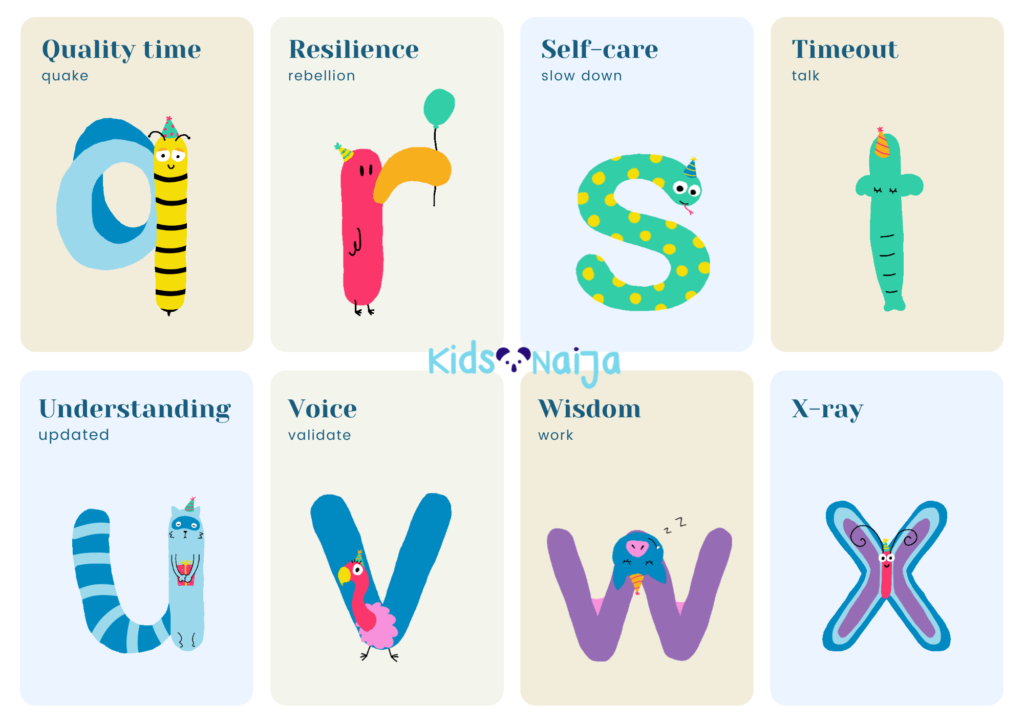
Q for Quality time and q for quake
It’s not about being in the same space with the kids, but it’s about being present and spending quality time with them. Do something you all will enjoy.
Quake: When shaken with fear, worry, or anger, remember to find your calm.
R for Resilience and r for rebellion
You do understand the importance of raising resilient kids so let’s not flog the subject so much! Raise your kids to be resilient and tough, not mean. Resilience is a life skill that’ll get them through the difficulties of life.
Okay, rebellion frightens a lot of parents and that’s okay. However, I think it’s only natural for kids to rebel but that doesn’t automatically make them bad kids. Didn’t you ever rebel against your parents? Or in other words, stand up to them?
S for Self-care and s for slow down
You can’t effectively care for another human if you don’t take care of yourself. So, if you’re feeling overwhelmed, slow down and take care of yourself. Here are a few ways on how you can effectively de-stress and relax!
T for Timeout and t for talk
A vacation with the children is fun but a vacation with just you and your partner is also a lot more fun. If you can’t have a private vacation, at least have a time-out session. You can put up a sign on your door that says “it’s timeout session”. While at this, you can have a babysitter come over if the kids are still pretty young.
Gist with your kids and share your feelings with them. Some parents replace talking with rumination – don’t do that with kids. There’s nothing healthy about rumination.
https://kidsnaija.com/wp-content/uploads/2021/04/Parent-child-co-rumination.mp4
U for Understanding and u for up-to-date
Ever felt like your parents understood you? If yes, how did it make you feel? Is it something you think your child would want to feel as well?
However, if your answer is no, that is they never understood you, then think about how frustrating it was. That’s enough reason to make you put effort into understanding your child.
Up-to-date? Children grow and their interests change. Hence, don’t assume that your child’s BFF is always going to be their kindergarten friend or that their favourite colour is always going to be red.
V for Voice and v for validate
Now, let’s talk about voice for kids. If you’re listening to your child, creating room for open communication, and understanding them, then you’re most likely letting them use their voice.
But how about their inner voice (or self-talk)? How we talk to kids ultimately become their inner voice, and if all the child hears are negative statements, then the child’s self-talk experience might be negative.
Validate their feelings, don’t be dismissive. It’s easy to dismiss their feelings like those involving childhood fears, but don’t do that.
W for Wisdom and w for work
When dealing with kids, apply wisdom – be their favourite smart pants! Don’t handle every situation at face value, sometimes, there’s more to their actions.
Don’t be deceived; parenting is a lot of work.
X for X-ray
Here’s where we break the norm – couldn’t find any other term for x. What should the x-ray be for? Frequently examine your parenting style: does it strengthen or break the bond between you and your child?
What parenting mantra are you holding on to that you should let go of?
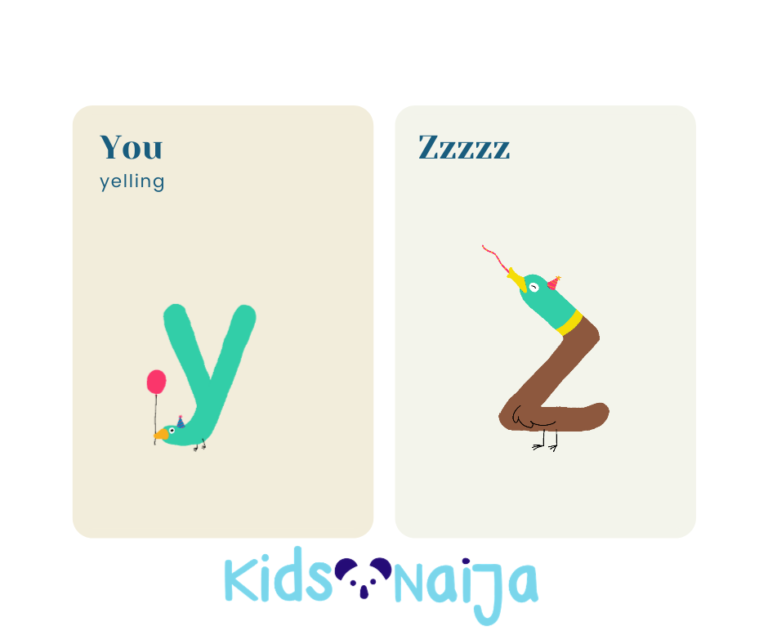
Y for You and y for yelling
Parenting involves you but it isn’t all about you. It’s not about you recreating the life you wish you had through your child; you should let your child live their own lives.
Who else is on the no yelling challenge? This isn’t easy at all but I think it’s relatively easier accepting that there will be days where you going to lose your cool and yell so much that your vocal cords hurt. After the “yelling episode”, fix things with your child. Don’t let time cover up the episode, approach your child and talk about it all.
Z for Zzzz
Get some sleep. Of course, if your little one is still just a few months old, you won’t get so much but it does truly get better. Whenever you can, shut those eyes and dream of la-la land.
Final words
If you made it up to letter z, then caps off for you. How did you find the list? What words would you have loved to see on the ABCs of parenting? Let us know in the comment section.
And cheers to you and your family!



4 Comments
Helen · April 14, 2021 at 9:54 pm
I love it
Naga Odigie · April 16, 2021 at 3:05 am
Thanks for loving it!
Sophia · April 14, 2021 at 10:44 pm
Enjoyed every word of it
Naga Odigie · April 16, 2021 at 3:05 am
So glad to hear that!
Comments are closed.